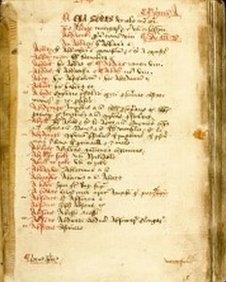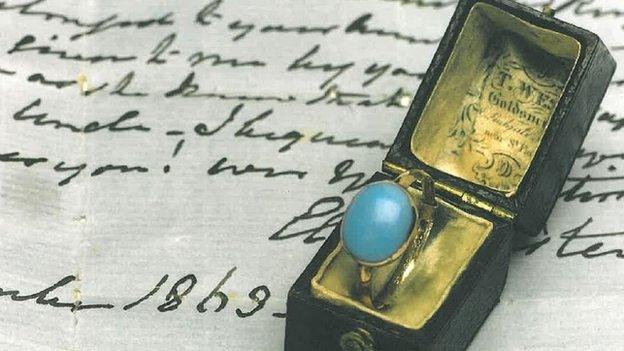British Library saves 15th Century Catholicon Anglicum from export
- Published

It is believed the dictionary was written in the north of England
The British Library has paid to keep a 500-year-old dictionary in the UK after it was sold to an overseas buyer at auction.
An export bar was put in place to stop the sale of the Catholicon Anglicum. Its deadline was Monday.
The bar required that a UK organisation make a matching offer for the "crucial" Middle English-Latin dictionary to prevent it going abroad.
The British Library paid £92,500 for the manuscript.
It is regarded as one of the earliest examples of an English dictionary and is thought to have been written in the north of England around 1483.
Culture Minister Ed Vaizey put the export bar in place last year. At the time, he said the dictionary was of "outstanding significance" to the history of the English language and "fundamental to the identity and life of our nation".
It represented a "crucial milestone" in the evolution of the English dictionary, his department said, and was the only complete one in existence.
'Invaluable and unique'
The only other known copy is held at the British Library, but it has lost leaves in several places.
It is believed the dictionary was written in Yorkshire, based on the dialect of the English words present.
The Catholicon Anglicum was written to help students with Latin composition during a time when many grammar schools were founded.
Meanwhile, the British Library also paid £116,500 for a printed manuscript that documents an argument between two bishops over the right of priests to marry.
The 16th Century manuscript, is thought to have been written by Stephen Gardiner, the Bishop of Winchester and Lord Chancellor of England.
It is considered to be an important document for the study of the English Reformation.
The British Library paid for it with help from an anonymous donor.
The culture minister said both purchases would make "a tremendous addition" to the British Library.

Pop star Kelly Clarkson bought Jane Austen's ring at auction for £152,450 in 2012
Head of history and classics at the library Dr Scot McKendrick added: "I am extremely pleased that the British Library has secured for the nation these two invaluable and unique witnesses to our history.
"We are committed to making them widely accessible online and to researchers in our manuscripts reading room, and we anticipate that study of these books will contribute enormously to our knowledge of their respective periods and subjects."
Another example of an export bar being used successfully involved the American singer Kelly Clarkson.
The star bought the former ring of author Jane Austen at auction for £152,450 in 2012. But after Mr Vaizey imposed an export bar the Jane Austen's House Museum in Hampshire found the cash to keep the heirloom in the country.
- Published17 March 2014
- Published6 February 2013
- Published6 November 2013
- Published8 February 2013
- Published17 August 2012